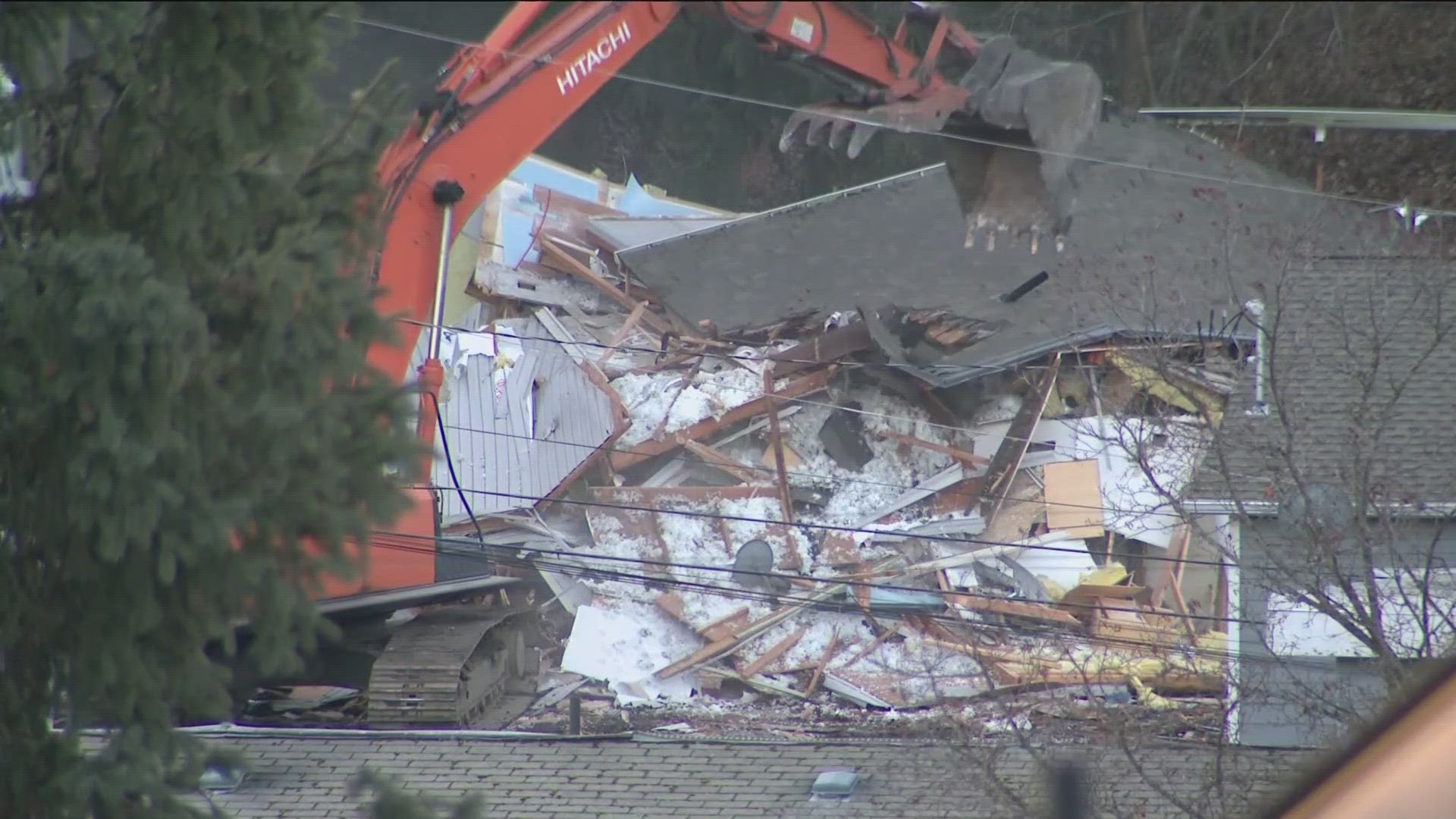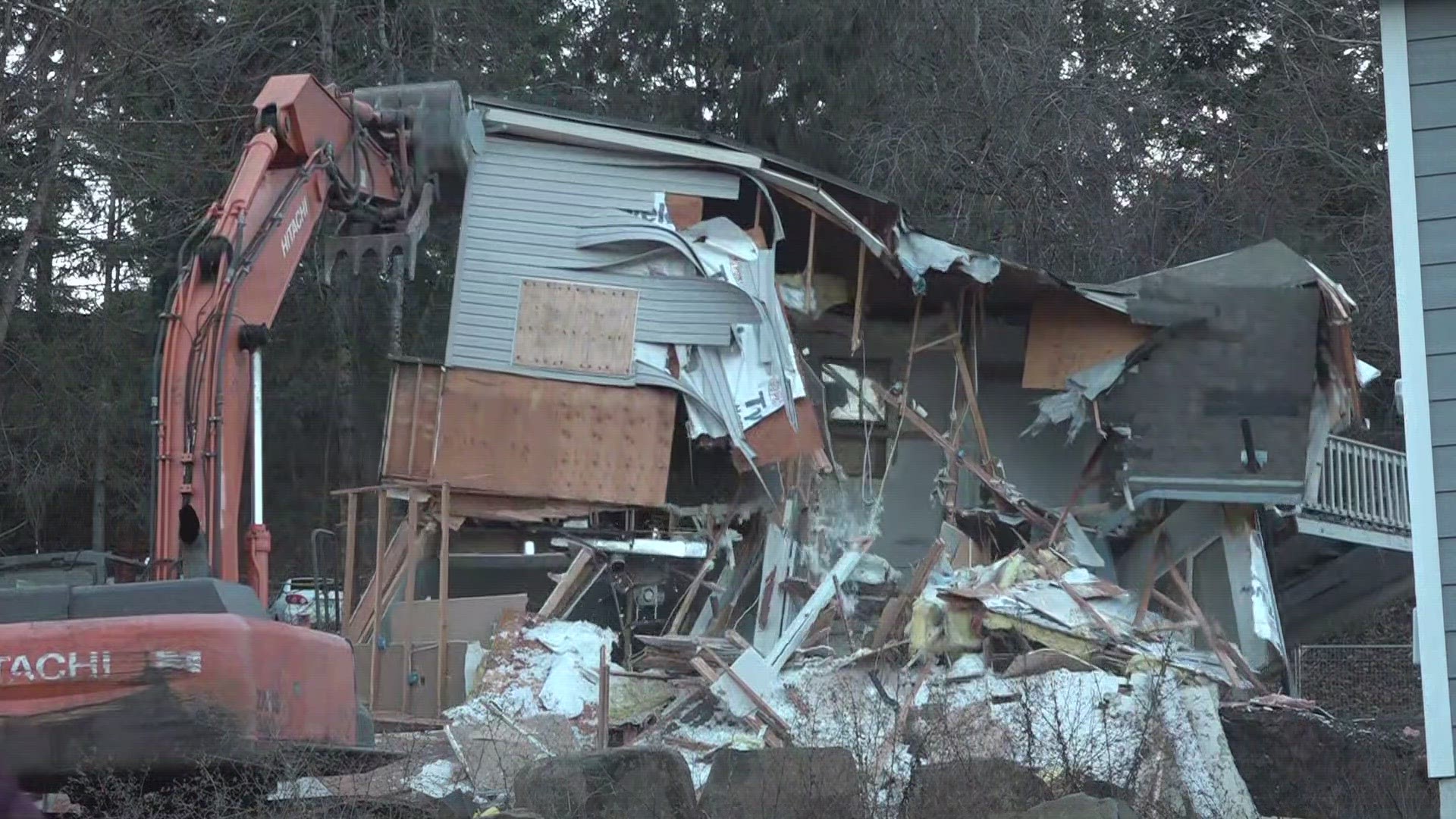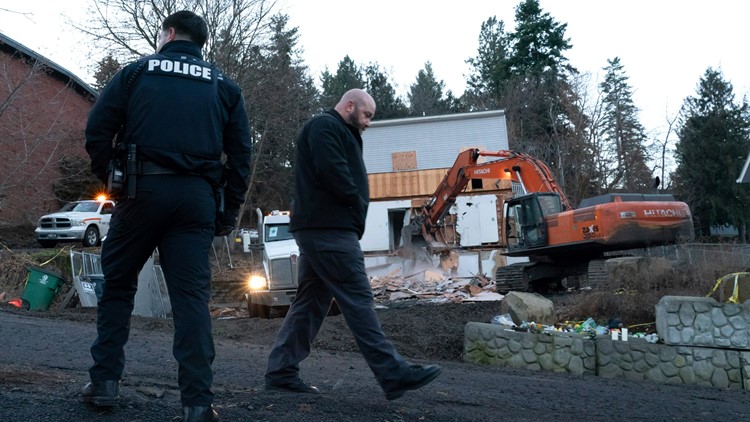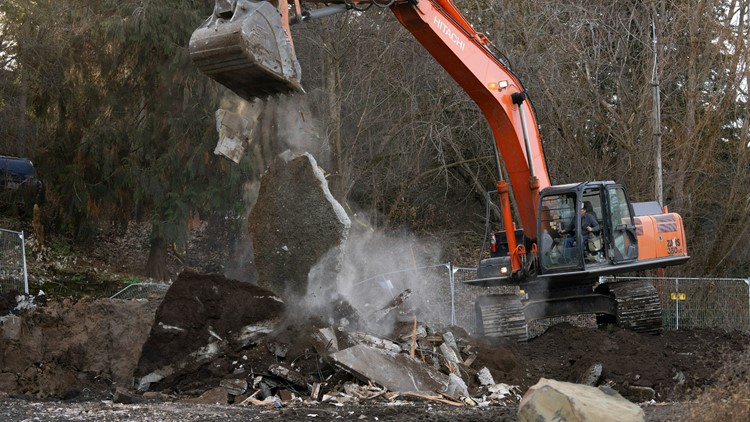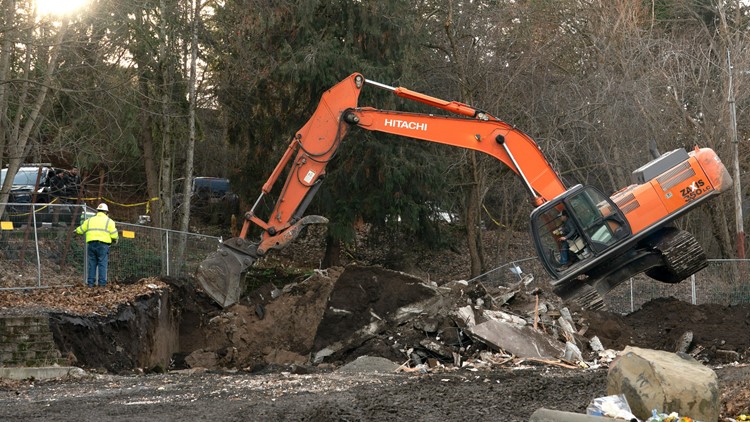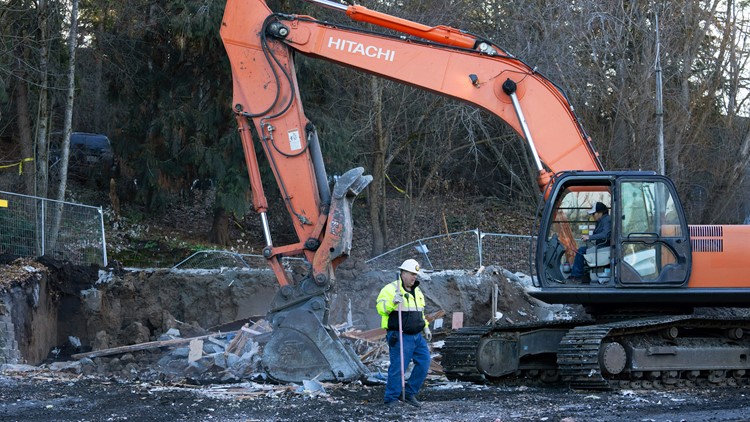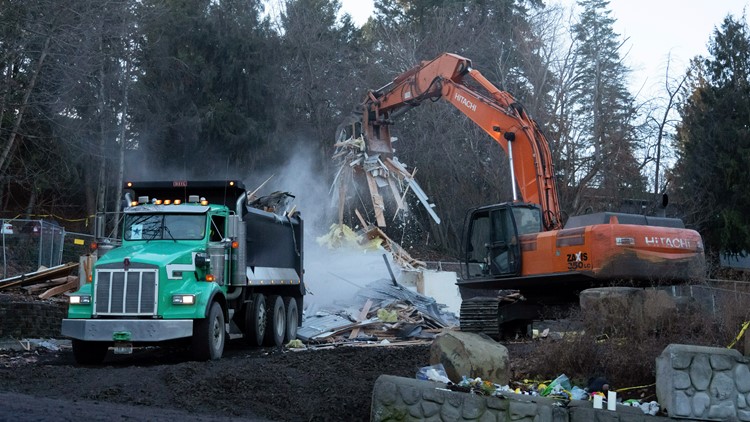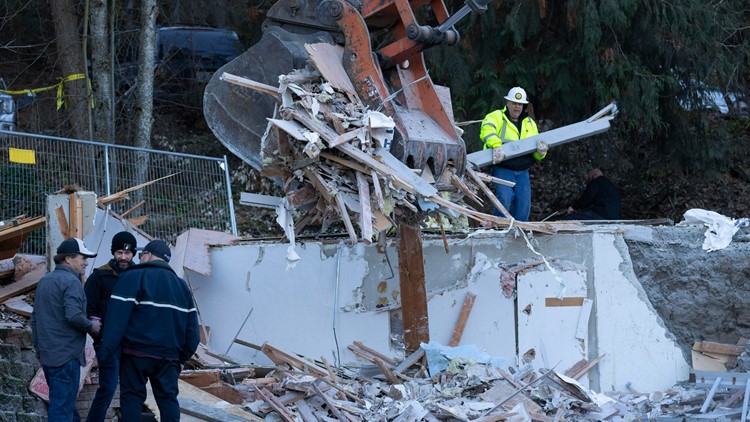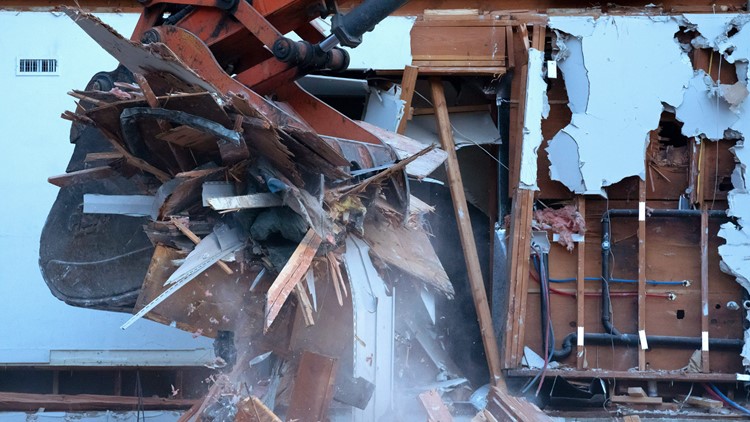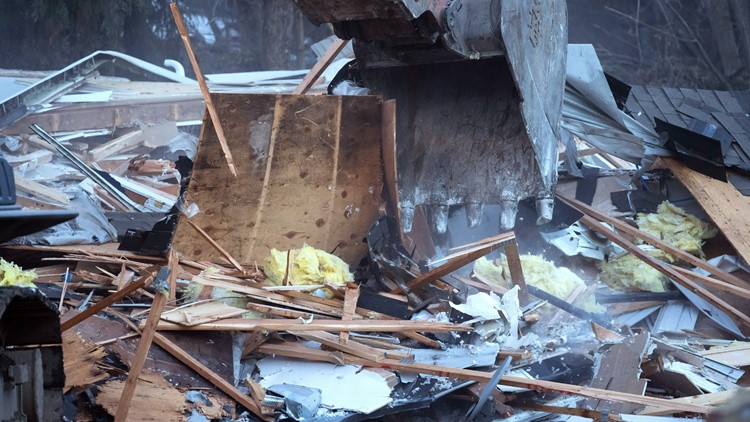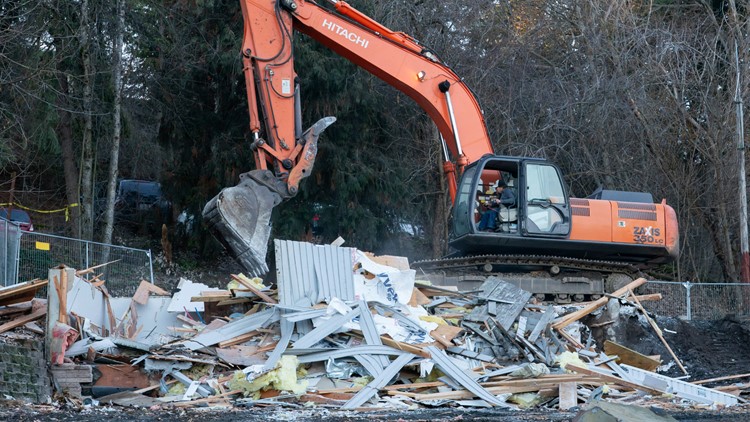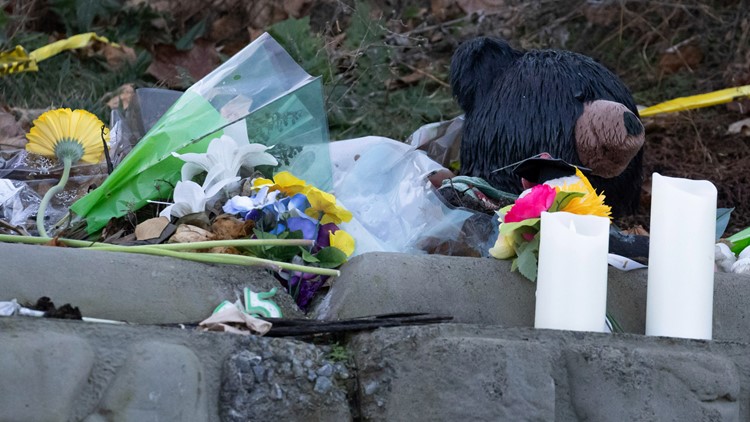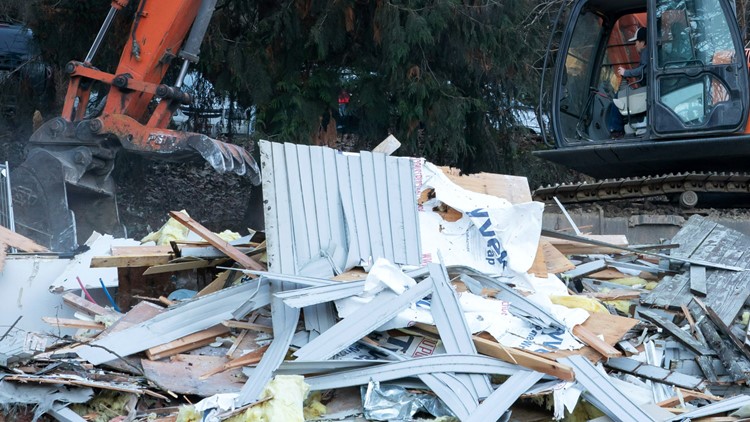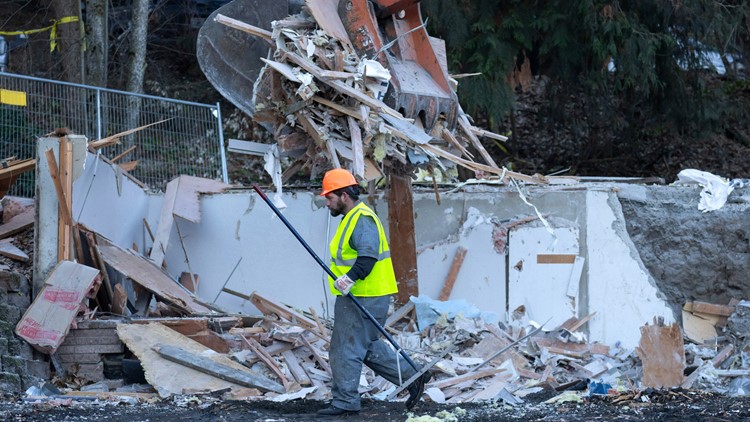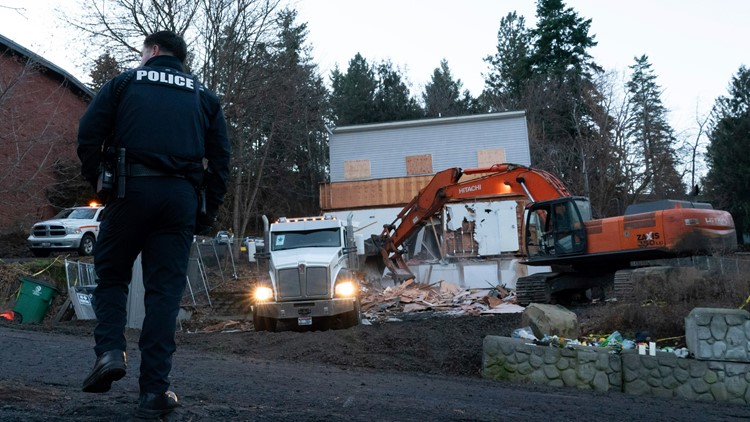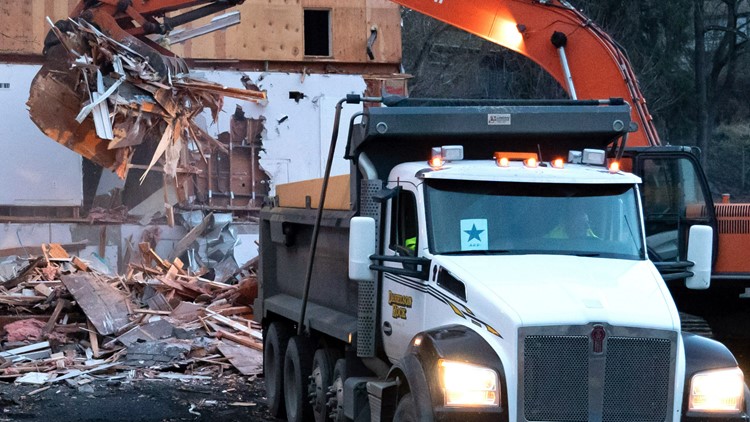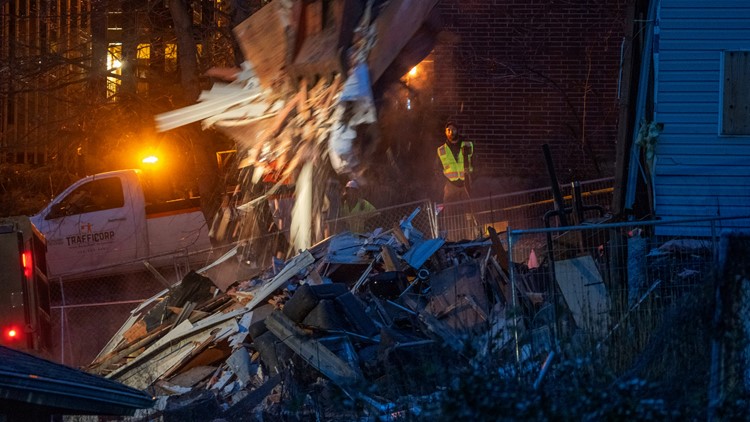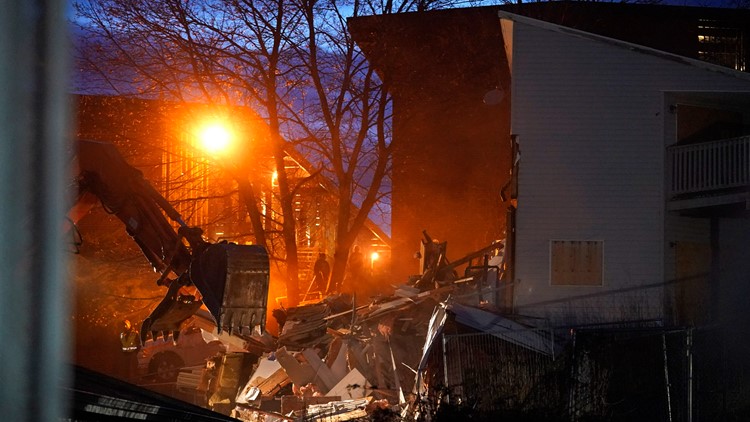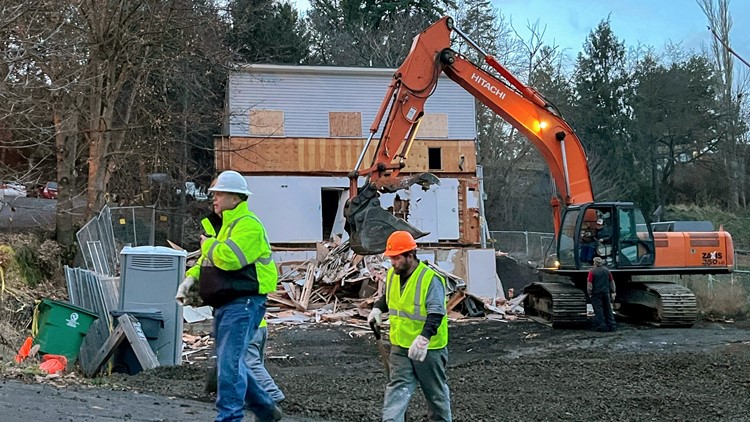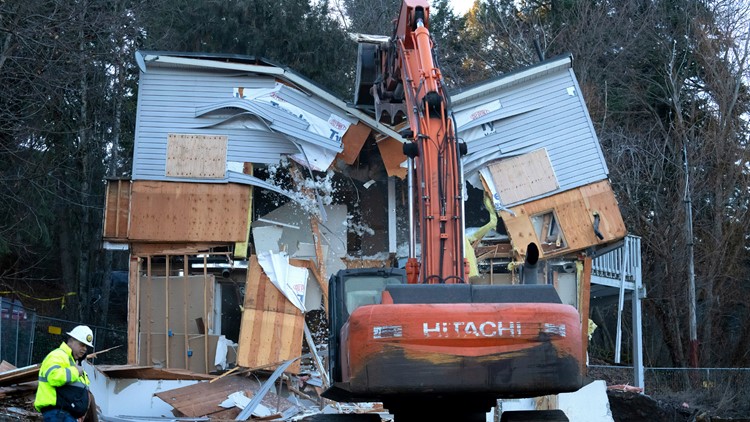MOSCOW, Idaho — Demolition of the house on King Road in Moscow, Idaho, where four University of Idaho students were brutally murdered last November, began early Thursday morning.
The decision made by the University of Idaho has sparked controversy, particularly among some of the victims' families, who contest the demolition. The family of victim Kaylee Goncalves stated on Dec. 21, "the University of Idaho wants to destroy one of the most critical pieces of evidence in the case."
Ethan Chapin, Xana Kernodle, Madison Mogen and Kaylee Goncalves were murdered in the off-campus residence, referred to as the "King Road house," on Nov. 13, 2022.
Despite concerns, the university argues that the demolition of the house is necessary for the community to begin healing from the brutal murders, by ridding of the reminder that, until Thursday, remained prominently on a hill, boarded up and taped off.
Watch video of King Road house demolition:
At the time of the murders, the home was being rented out by an individual to three of the four students killed. The owner of the house gave the property to the University of Idaho the following spring. The university then made the decision to demolish the home to eliminate the grisly reminder of the murders that occurred there.
"We know that every action and decision around this horrific incident is painful and invokes emotions. That is why every decision we have made this far is with the families of the victims and our students in mind," UI President Scott Green said. "This is a healing step and removes the physical structure where the crime that shook our community was committed."
"Demolition also removes efforts to further sensationalize the crime scene," Green added.
University officials plan to construct a memorial called "Vandal Healing Garden and Memorial" on the university campus in memory of the victims.
"I knew that we would have to create some kind of memorial to remember these four bright souls that we lost, so we are creating a Vandal Healing Garden and Memorial. It's nestled in a quiet secluded place surrounded by trees," said Blaine Eckles, Dean of Students at the University of Idaho. "We have our students in the art and architecture programs that are leading the way with gathering ideas and research for what a design could look like for that. I'm really excited to see what the students are going to do with it."
The University of Idaho stated in a news release that "neither [prosecution nor defense] has asked for the house to be retained and U of I will proceed with demolition."
However, the defense and the families of three of the victims have repeatedly pled with the university, asking them to preserve the house until after the murder trial has concluded.
"Isn’t this the whole point of not destroying evidence? You may not know if you need it until later or it may become more important once a jury hears evidence in a case," read a statement from the Goncalves and Kernodle families.
Photos: King Road house demolition
Victims' families' pleas to halt King Road house demolition
"Nobody is listening and everyone tells you how sorry they are for the decision, but the families’ opinion isn’t a priority," said the Goncalves family. "Victims' families have a voice and should be heard and listened to!"
On Wednesday, one day before the demolition was to begin, the Goncalves and Kernodle families issued one final plea to delay the demolition of the house.
Wednesday's statement is just one of several from some of the families.
Goncalves family and Kernodle family statement, Dec. 27:
PLEASE STOP THE DEMOLITION OF THE KING ROAD HOME! The Goncalves Family has reached out to the Latah County Prosecutors Office and the University of Idaho to stop this madness.
When the victims can’t speak you have to speak for them when you feel someone is hurting the case. Let’s just answer the question on why the King Road house should stand for basic evidentiary purposes.
1. What were the vantage points of the roommates (Dillon and Bethany)? What could they hear from where they were in the house? What could they see? How far away was Dillon when she saw BK and why didn’t he see her? Could the surviving roommates hear a dog barking from the 3rd floor? Screams? Can you hear those same sounds from the bottom apartment?
2. Outside the house. If evidence is presented about BK leaving or watching the house. What windows could he see in from where he was parked? Was he able to view the inside of the house and what was going on from outside sitting in a car or walking by? (Goes towards pre-mediation). How long did it take for him to walk to his car? What points of entry could he have gotten into the house?
3. If there is audio evidence? What can you hear standing outside the house? What can you hear inside the house?
4. What was Xana’s path in the house to pick up the Doordash? Did she have to walk past different rooms? Could she have walked past BK? Where could he have been hiding?
5. All the entry and exit points in the home. How could you get in and out without anyone seeing you? Were the decks potential access points? Since the decks and landscape features are very close to each other.
6. Any biological evidence? Where was it located in the house? Any proximity to the victims? Was there any trail outside of biological evidence and its proximity to the house?
7.If the house itself was a target? (Which was the theory from the beginning. Which is the supposed reason the University of Idaho called off their campus wide warning while BK was still not apprehended.) Why was the house a target? What are all the access/exit points to the property? The driveway configuration for a vehicle to enter/exit/turnaround?
8. What are the Vantage points of other camera evidence pointed toward the house? Distance, view, lighting, etc...
These are just a few things that the family has thought of, and no one seems to be able to answer about the King Road house. The question is: If the home is demolished, will all of these questions be able to be answered later on with diagrams/models/technology, etc... if they become an issue at trial? If not, then leave the home alone!
We feel that the University of Idaho and the Court has put us in a horrible position to have to voice our opinions. We all along have just wanted the King Rd. Home to not be demolished until after the trial and for us to have a trial date so that we can look forward to justice being served. Is that really too much to ask?
The families would like to thank everyone across the country for your support on this issue and appreciate all of your hopes and prayers!
Goncalves family statement, Dec. 21:
"...That has been our question to the prosecution and the University of Idaho for the entire time the demo of the King Road has been an issue. But why is it even up for discussion? This is one of the most horrific crimes in the history of Idaho and the University of Idaho wants to destroy one of the most critical pieces of evidence in the case - and it is also important to make note that there is now a demolition date before there is even a trial date set. This alone speaks volumes.
It is obvious from the two recent visits to the house, by both the Prosecution and the Defense, that there is still evidentiary value in having the King Road house still standing. There may be additional discovery by either party that prompts one side or the other to go back to the scene of the crime. There has always been a dialogue about their 3-D imaging, or they are building a model to replicate the home, etc.…First and foremost, what a waste of state money and resources and secondly, nothing replaces the real thing. Jurors are notoriously unpredictable, and they tend to make decisions on a variety of facts and circumstances. It would be foolish of us to try and foresee what they will want or need to make a just verdict in this case.
The family has stressed tirelessly to the prosecution and the University of Idaho the importance (evidentiary and emotionally) that the King Road house carries, but nobody seems to care enough. It’s like screaming into a void. Nobody is listening and everyone tells you how sorry they are for the decision, but the families’ opinion isn’t a priority. Victims' families have a voice and should be heard and listened to!"
Statement on behalf of Jeff Kernodle, father of Xana Kernodle, and the Goncalves family, Oct. 31:
“As the family has stressed from the beginning of this investigation, the King Road house is one of the most critical pieces of evidence in this case. We are grateful that the University of Idaho listened to the families concerns and delayed the demolition of the home. Isn’t this the whole point of not destroying evidence? You may not know if you need it until later or it may become more important once a jury hears evidence in a case. It is our understanding that the King Road residence will not be demolished until after the trial has concluded. On another note, it is important for families of victims to stay involved in this process and trust your gut when it comes to standing up for the victims in the case. Our voice has been loud and consistent and will stay that way for Kaylee, Xana and all the victims until justice has been served.”
After the trial of primary suspect, Bryan Kohberger, was "delayed indefinitely" in October, several entities involved in the case were given permission to go inside the home to gather more information on the scene of the crime in preparation of the pending trial. Over the past two months, the FBI, prosecution and defense have entered and examined the house.
Kohberger is charged with first-degree murder and felony burglary in the killings of Ethan Chapin, Xana Kernodle, Kaylee Goncalves and Madison Mogen. The four University of Idaho students were murdered in an off-campus residence - referred to as the "King Road house" - on Nov. 13, 2022.
Prosecutors allege lab results deemed Kohberger was a positive match to DNA found on a knife sheath at the scene, located underneath Mogen and Goncalves' bodies. Kohberger, a former criminology student at Washington State University, was arrested in December 2022 at his family's home in Pennsylvania and extradited to Idaho on Jan. 4, 2023, to face the murder charges.
Due to a gag order imposed by the court, no information or comment was provided by the prosecutor's office, investigators or law enforcement.
A trial date has yet to be set in the State of Idaho v. Bryan Kohberger case.
Watch more coverage of this story
Ongoing coverage of the University of Idaho investigation can be found in our YouTube playlist:
HERE ARE MORE WAYS TO GET NEWS FROM KTVB:
Download the KTVB News Mobile App
Apple iOS: Click here to download
Google Play: Click here to download
Watch news reports for FREE on YouTube: KTVB YouTube channel
Stream Live for FREE on ROKU: Add the channel from the ROKU store or by searching 'KTVB'.
Stream Live for FREE on FIRE TV: Search ‘KTVB’ and click ‘Get’ to download.

